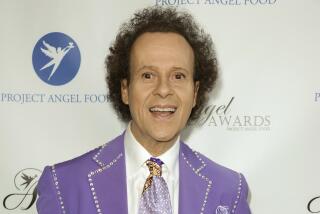PBS’ ‘Cancer’ an epic, vital story Ken Burns just couldn’t refuse
Edward Herrmann had collapsed at the studio in New York, and no one knew why.
The actor had arrived to record his narrator part for Ken Burns’ latest documentary epic for PBS, “Cancer: The Emperor of All Maladies.” The three-part, six-hour film, based on the Pulitzer Prize-winning bestseller by Dr. Siddhartha Mukherjee, traces the story of the disease from its earliest accounts in ancient Egypt to the latest scientific breakthroughs and their impact on real-life patients.
Herrmann, a favorite collaborator of Burns’, was helped up by colleagues after he had crumpled to the floor and was soon back at the microphone. “But during the break, he came back into the booth and explained that he not only had cancer, he had terminal cancer, brain cancer,” the film’s director, Barak Goodman, said. “He was confident he could finish this. … He felt it was appropriate that this be his final project.”
Herrmann — who died last December at 71 — did finish his work on “Cancer,” which premieres on PBS stations on Monday. But that cancer cells were ravaging his body as he narrated the story of humanity’s battle against the disease offered a haunting symbolism. This is an illness so frightening that people sometimes find it hard even to utter its name, resorting to such euphemisms as the “C-word.”
Despite decades of increasingly sophisticated medical research, cancer remains relentless. And ubiquitous. Burns, the director behind “The Civil War” (PBS’ No. 1 series of all time), “Jazz” and many other documentaries, lost his own mother to breast cancer when he was 11.
Cancer is perhaps the most-feared of all diseases — which is exactly why Burns sees it as a vital topic, if never a welcome one.
“The essence of drama is conflict, and the essence of conflict is live or die,” the filmmaker — a trim, bearded man who looks much younger than his 61 years — said in a joint interview with Goodman and Mukherjee. “Those are the stakes here. … One out of three women and half of all men will get cancer” at some point in their lives.
“There are sad moments and there are exultant moments” in the film, he added. But “if you’re curious about who you are and what your fate is, you’ve got to know about this.”
Personal stake
The roots of “Cancer” go back a decade.
Sharon Rockefeller, the wife of former Sen. Jay Rockefeller and the chief of WETA-TV, the powerful PBS member station in Washington that produces “NewsHour” and other programs, learned in 2005 that she had stage 3B colon cancer. That meant that malignant cells had spread to lymph nodes but not yet to more distant regions of the body.
Even so, “I had what I call ‘bad math’ — a 20% chance of living five years,” she told reporters at the TV press tour in Pasadena this year (some statistics published online recently offer much more optimistic odds).
During a follow-up hospital stay, she devoured Mukherjee’s book, “The Emperor of All Maladies,” which she said helped her to understand the disease for the first time. “I resolved that I would do anything I could to make ‘The Emperor of All Maladies’ into a film that would have immense impact,” Rockefeller said.
Cancer has been looked at many times before in films and on TV, of course. PBS itself aired “A Lion in the House,” a well-regarded 2006 documentary that told the stories of kids with cancer. The frequently high-stakes, life-or-death consequences of the disease have also inspired a number of fictional treatments.
The NBC series “Parenthood” featured a character struggling with breast cancer. Laura Linney played a middle-aged woman dying of melanoma on Showtime’s bittersweet “The Big C.” And of course, on AMC’s “Breaking Bad,” Bryan Cranston played a teacher who turns to selling meth after getting a terminal cancer diagnosis.
But Mukherjee’s book afforded PBS an opportunity to tell a true story of epic sweep. Mukherjee was able to balance the history of science with tales from his own training and practice. Reviewers praised the book for not only its scope but also its clear-eyed assessment of the progress and frustrations inherent in cancer treatment.
Rockefeller approached Burns, whose programs have been produced by WETA for more than 30 years. Burns was at that time engrossed in making his documentary “The Roosevelts: An Intimate History,” the story of the family that produced two American presidents; the film aired last fall. He has another film about baseball great Jackie Robinson, who broke down a major racial barrier in sports, coming in 2016.
Because he must raise funds in addition to researching and making the films, Burns and his collaborators have to map out projects years in advance, but Rockefeller proved persuasive. “I realized that I couldn’t not do it,” Burns said. “And doing it meant that I actually had to do something that I don’t do, which is hire someone else to be the director and producer.”
That person was Goodman, who has directed numerous episodes of “The American Experience” and “Frontline” for PBS. The 2001 documentary “Scottsboro: An American Tragedy,” which Goodman wrote and co-directed, was nominated for an Oscar for documentary feature. On “Cancer,” Burns served as executive producer and senior creative consultant, with the title card reading “Ken Burns Presents.”
Goodman and Burns realized early on the difficulty of telling the sprawling story of such a complicated disease, even with six hours of running time. So they were necessarily selective about which history to include. Viewers will learn, for example, about Dr. Sidney Farber, the mid-20th century pediatric cancer researcher whose work led to modern chemotherapy — and to fundraising breakthroughs such as the Jimmy Fund, which used a real-life child with cancer to help raise public awareness about the disease (the organization still exists and has raised money for the cancer center that bears Farber’s name).
But the film ushers the story into contemporary times with stories of patients struggling with the disease today. Among them: Dr. Lori Wilson, a Washington surgeon diagnosed with breast cancer. Angelo Meredino took photographs of his newlywed wife, Jennifer, as she battled and ultimately lost her fight with the disease.
And then there are the talking heads. As usual in a Burns project, viewers are treated to some of the most notable experts in the field. Dr. Jerome Groopman talks about the back and forth of research over the years. Dr. Richard Klausner, the former director of the National Cancer Institute, says of the race for a cure: “It’s constantly one step out of our reach.” And actor Terrence Howard tearfully recounts his mother’s battle against the disease.
But there is plenty of optimism in “Cancer.” The film revisits the major breakthrough of the 1970s, which established links between genes and cancer. As Herrmann intones, researchers now believe that “real, durable cures are not just foreseeable but inevitable.”
“One of the principal themes of the film,” Goodman said, “is to follow … how cancer is received in the culture, how it’s expressed. Our main characters are very instrumental in bringing cancer from a dark, hidden place to a public spotlight.”
One of those characters is Mukherjee himself, who served as an advisor on the film. Educated at Stanford and Harvard Medical School, he is an oncologist who teaches at Columbia University and has been a visiting professor at the Mayo Clinic.
“Cancer represents the very best and the very worst of human physiology,” he said. “The capacity of our selves to grow, to resist toxins, to move — these are borrowed from normalcy. Cancer is a kind of malignant twin to our selves.”
The science can be impenetrable even to experts, but Burns and his collaborators are confident that “Cancer” will give viewers an understanding of an illness that they previously knew only through fear.
“We bring it down to the level where people can understand,” Goodman said. “Why some cancers are still basically untreatable, while others are curable, and where we’re going, how we’re going to address those [untreatable] forms of cancer in the next 20 or 30 years.”
For his part, Burns insists the topic is not as depressing as it might first sound. The work on “Cancer” has convinced him that a cure might not be as far off as it sometimes seems. “Just as progress has often led to intolerable failure,” he said, “failure has been the sponsor of so much extraordinary progress.”
Twitter: @scottcollinsLAT
------------
‘Cancer: The Emperor of All Maladies’
Where: KOCE
When: 9 p.m. Monday, Tuesday and Wednesday
Rating: TV-14 (may be unsuitable for children under age 14)
More to Read
The biggest entertainment stories
Get our big stories about Hollywood, film, television, music, arts, culture and more right in your inbox as soon as they publish.
You may occasionally receive promotional content from the Los Angeles Times.







